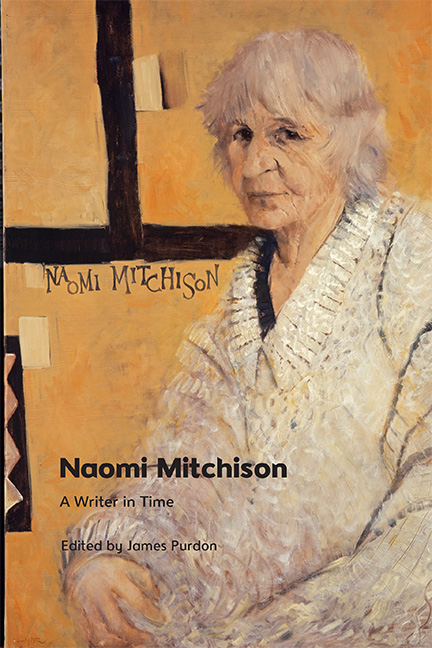Book contents
- Frontmatter
- Contents
- Acknowledgements
- Notes on Contributors
- Introduction
- 1 Naomi Mitchison’s Interwar Short Stories
- 2 ‘She had her hand on the plow’: Shame, Uncertainty and Transformation in The Corn King and the Spring Queen
- 3 Varieties of Sexual Experience: Naomi Mitchison, Mysticism and Gerald Heard
- 4 Scientific Temporalities in We Have Been Warned and ‘Beyond This Limit’
- 5 Send in the Clones? Naomi Mitchison and the Politics of Reproduction and Motherhood
- 6 From Argyll with Love: Naomi Mitchison and the Soviet Union
- 7 Fire or Blood? Aestheticising Resistance in Naomi Mitchison’s The Blood of the Martyrs
- 8 ‘The summoning urgent thing’: The Bull Calves and the Drive to Experiment at Mid-Century
- 9 Mitchison, Decolonisation and African Modernity
- Naomi Mitchison’s ‘Europe’
- Europe
- Bibliography
- Index
8 - ‘The summoning urgent thing’: The Bull Calves and the Drive to Experiment at Mid-Century
Published online by Cambridge University Press: 18 November 2023
- Frontmatter
- Contents
- Acknowledgements
- Notes on Contributors
- Introduction
- 1 Naomi Mitchison’s Interwar Short Stories
- 2 ‘She had her hand on the plow’: Shame, Uncertainty and Transformation in The Corn King and the Spring Queen
- 3 Varieties of Sexual Experience: Naomi Mitchison, Mysticism and Gerald Heard
- 4 Scientific Temporalities in We Have Been Warned and ‘Beyond This Limit’
- 5 Send in the Clones? Naomi Mitchison and the Politics of Reproduction and Motherhood
- 6 From Argyll with Love: Naomi Mitchison and the Soviet Union
- 7 Fire or Blood? Aestheticising Resistance in Naomi Mitchison’s The Blood of the Martyrs
- 8 ‘The summoning urgent thing’: The Bull Calves and the Drive to Experiment at Mid-Century
- 9 Mitchison, Decolonisation and African Modernity
- Naomi Mitchison’s ‘Europe’
- Europe
- Bibliography
- Index
Summary
The Highlander Black William, in Naomi Mitchison’s wartime historical novel based on her Haldane family, The Bull Calves (1947), is listening to pipe music, and begins to feel in his body the call of history, sex and nation:
But Black William was listening to the pipe music, the summoning urgent thing, the wee sharp waves of the tune beating on his stomach, the buzz of the drone shoving at his feet to come. Aye, to Kirstie.
What is driving him to Kirstie is sexual attraction (so between the stomach and the feet), but is also a summoning thing, urgent as a drive or knot of drives, calling him to join in the dance with the Lowlander ‘she-Haldane’ as if by some nationalist, destinarian form of Darwinian sexual selection. It is nationalist since the conjoining of William Macintosh and Kirstie Haldane would marry the two poles of the new Scotland of the post-1745 Union, fulfilling the destiny of necessary integration after the disastrous civil strife of the Jacobite risings. The ‘wee sharp waves’ and the ‘buzz of the drone’ might be said to bring to union the drive to sociality and common future as enlightened nation (the overt music of the tune of the chanter), and the drive to fusion of the male and female moving from biological affect to kinship affection (the groundbass of the drone) – it is the tune which moves the sex drive (stomach), and the drone the social body (dancing feet), knotting together the political and erotic.
For Mitchison, that nationalist music of the Scottish body integrates, through kinship relations, families acting as survival zones for the communitarian potential and rootedness associated with the clan system that Culloden had destroyed. This chapter examines the Haldane family network in the eighteenth century representing a Scotland entering a transitional, experimental phase triggered by the Knox Revolution, the Union, the Jacobite uprisings and the destruction of the clan system in 1745 as communicated to Mitchison through the female, not patriarchal, line. This network is consciously attended to in relationship to the post-1945 experiments in family, nation and class under feminist and communitarian reconfigurations that Mitchison supported and advocated.
- Type
- Chapter
- Information
- Naomi MitchisonA Writer in Time, pp. 122 - 134Publisher: Edinburgh University PressPrint publication year: 2023



